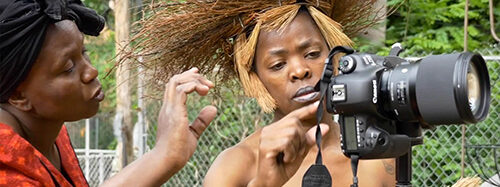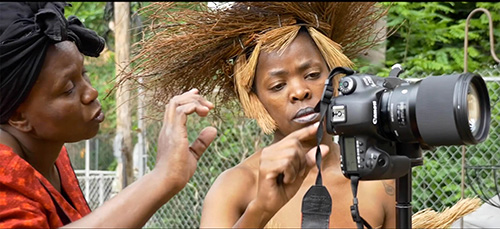

Women – as the first recourse
Leago Mamabolo meets women helping themselves develop their art

There is great value and importance in documenting yourself- particularly for disenfranchised groups who have historically been left out of the picture. Given this, it is no surprise why Zanele Muholi, a South African woman and internationally renowned visual artist, would lead the inspirational project of a Women’s Mobile Museum (WMM). Muholi describes photographing yourself as “giving yourself a voice”.
The year-long project, based in Philadelphia, saw ten women (mostly of colour), who are inhabitants of the city, grow in their photography and art curating skills. The film, Women’s Mobile Museum: Portraits of Visual Activism was produced and directed by filmmakers, Cindy Burstein and Anula Shetty. It is one of the International Short Film screened at the 2020 Encounters film festival.
In the film each artist is introduced with a self-quote that encapsulates their work. They go on to explain who they are and what parts of their identity inform the ways in which they present their art. Davelle, for example, a veteran focuses on highlighting women veterans of colour as well as queer veterans of colour. With the intention of bringing art to communities that are not traditionally considered ‘artistic’, the Women’s Mobile Museum hosts an exhibition of their works in the gym of a recreational centre in the city. This is done to create a culture around visiting museums in urban spaces. The curation is facilitated by Renée Mussai who is a London-based curator, art historian and writer. She pays careful attention to maintain the identity of the Philadelphia community within the gym space.
This is not simply a story about women and community. It is a story about different kinds of women creating opportunities for themselves and one another. These are women who are young and old, some are immigrants, some are queer, some are Black, and some are mothers, painters, Muslim and poets. While there is uniqueness in all their differences there is also the resounding reality that they are brought together by the need to be represented. Throughout the film we witness members active in conversation and critique of their work which Zanele Muholi facilitates. Seeing these moments is engaging for the viewer in tracking the growth of each woman. The essence of this project and film is in the fact that everyone becomes a mentor. This is a must watch and highly recommended film to experience how women can learn to be one another’s recourse.







Leave a Reply